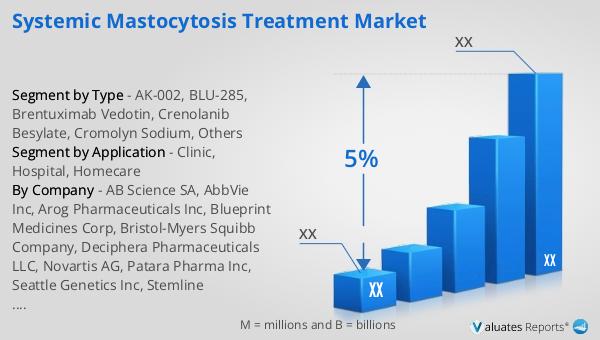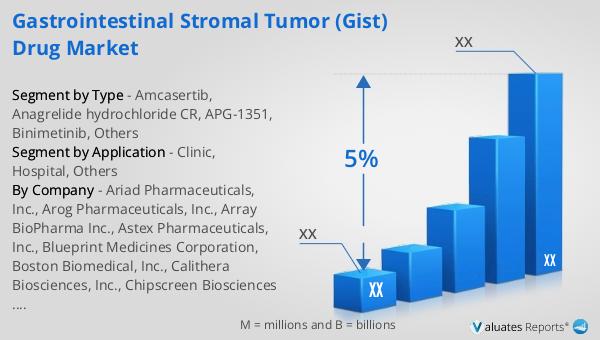What is Global Systemic Mastocytosis Treatment Market?
The Global Systemic Mastocytosis Treatment Market is a specialized segment within the broader pharmaceutical industry, focusing on therapies for systemic mastocytosis, a rare disorder characterized by the accumulation of mast cells in various tissues. These mast cells, which are part of the immune system, can cause a range of symptoms when they accumulate excessively, including skin lesions, gastrointestinal issues, and anaphylaxis. The market for treatments is driven by the need to manage these symptoms and improve the quality of life for patients. Treatment options include medications that target the underlying causes of mast cell proliferation and those that alleviate symptoms. The market is influenced by ongoing research and development efforts, regulatory approvals, and the availability of innovative therapies. As awareness of systemic mastocytosis increases, so does the demand for effective treatments, making this a dynamic and evolving market. The focus is on developing targeted therapies that can provide relief with minimal side effects, addressing both the physical and emotional challenges faced by patients. This market is crucial for advancing medical understanding and offering hope to those affected by this complex condition.

AK-002, BLU-285, Brentuximab Vedotin, Crenolanib Besylate, Cromolyn Sodium, Others in the Global Systemic Mastocytosis Treatment Market:
AK-002, also known as lirentelimab, is a monoclonal antibody that targets Siglec-8, a receptor found on mast cells and eosinophils. In the context of the Global Systemic Mastocytosis Treatment Market, AK-002 is being explored for its potential to reduce mast cell activity and alleviate symptoms associated with systemic mastocytosis. By binding to Siglec-8, AK-002 can induce apoptosis, or programmed cell death, in these cells, thereby reducing their numbers and the severity of symptoms. This targeted approach is promising for patients who have not responded well to traditional therapies. BLU-285, also known as avapritinib, is another significant player in this market. It is a selective inhibitor of the KIT D816V mutation, which is commonly found in patients with systemic mastocytosis. By inhibiting this mutation, BLU-285 can effectively reduce mast cell proliferation and improve clinical outcomes. This drug represents a targeted therapy that addresses the genetic underpinnings of the disease, offering a more personalized treatment option. Brentuximab Vedotin is an antibody-drug conjugate that targets CD30, a protein expressed on the surface of certain mast cells. While primarily used in the treatment of lymphomas, its application in systemic mastocytosis is being investigated due to its ability to deliver cytotoxic agents directly to mast cells, thereby reducing their numbers and activity. Crenolanib Besylate is a tyrosine kinase inhibitor that targets multiple pathways involved in mast cell proliferation. Its role in the systemic mastocytosis treatment market is based on its potential to inhibit the growth and survival of mast cells, offering another avenue for managing this complex disease. Cromolyn Sodium is a mast cell stabilizer that has been used for many years to manage symptoms of mastocytosis. It works by preventing the release of histamine and other inflammatory mediators from mast cells, thereby reducing symptoms such as itching, flushing, and gastrointestinal discomfort. Despite being an older treatment, it remains a valuable option for many patients. Other treatments in the market include various antihistamines, corticosteroids, and immunomodulators, each with its own mechanism of action and potential benefits. The diversity of treatment options reflects the complexity of systemic mastocytosis and the need for personalized approaches to care. As research continues, the market is likely to see the introduction of new therapies that offer improved efficacy and safety profiles, providing hope for better management of this challenging condition.
Clinic, Hospital, Homecare in the Global Systemic Mastocytosis Treatment Market:
The Global Systemic Mastocytosis Treatment Market finds its application across various settings, including clinics, hospitals, and homecare environments. In clinics, these treatments are often administered as part of routine outpatient care. Patients visit clinics for regular check-ups, where healthcare providers assess their condition and adjust treatment plans as necessary. Clinics serve as a primary point of contact for patients, offering a convenient setting for monitoring and managing symptoms. The availability of targeted therapies in clinics allows for personalized treatment plans that can be adjusted based on the patient's response. In hospitals, systemic mastocytosis treatments are typically administered to patients with more severe symptoms or complications. Hospital settings provide access to a broader range of diagnostic tools and specialized care, which is crucial for managing complex cases. Inpatient care may be necessary for patients experiencing acute symptoms or those undergoing intensive treatment regimens. Hospitals also play a critical role in the initial diagnosis and staging of systemic mastocytosis, utilizing advanced imaging and laboratory tests to guide treatment decisions. Homecare is an increasingly important aspect of the systemic mastocytosis treatment market, as many patients prefer the comfort and convenience of receiving care at home. Homecare services can include the administration of medications, monitoring of symptoms, and support from healthcare professionals. This approach allows patients to maintain their daily routines while managing their condition effectively. The use of telemedicine and remote monitoring technologies further enhances the feasibility of homecare, enabling healthcare providers to track patient progress and make timely interventions. The integration of systemic mastocytosis treatments into these various settings highlights the importance of a flexible and patient-centered approach to care. By offering treatment options across clinics, hospitals, and homecare environments, the market ensures that patients have access to the care they need, regardless of their location or the severity of their condition. This comprehensive approach is essential for improving patient outcomes and enhancing the quality of life for those living with systemic mastocytosis.
Global Systemic Mastocytosis Treatment Market Outlook:
In 2022, the global pharmaceutical market reached a valuation of 1,475 billion USD, demonstrating a steady growth trajectory with a compound annual growth rate (CAGR) of 5% projected over the next six years. This growth reflects the increasing demand for innovative therapies and the expansion of healthcare access worldwide. In comparison, the chemical drug market has shown a more modest increase, rising from 1,005 billion USD in 2018 to 1,094 billion USD in 2022. This segment of the market, while still significant, is growing at a slower pace than the broader pharmaceutical industry. The disparity in growth rates between the overall pharmaceutical market and the chemical drug market highlights the shifting dynamics within the industry. Factors such as the rise of biologics, personalized medicine, and advanced therapeutic modalities are driving the expansion of the pharmaceutical market beyond traditional chemical drugs. As the industry continues to evolve, the focus is increasingly on developing targeted treatments that address specific patient needs, leading to improved outcomes and greater patient satisfaction. This trend underscores the importance of innovation and adaptability in the pharmaceutical sector, as companies strive to meet the changing demands of the global healthcare landscape.
| Report Metric | Details |
| Report Name | Systemic Mastocytosis Treatment Market |
| CAGR | 5% |
| Segment by Type |
|
| Segment by Application |
|
| Consumption by Region |
|
| By Company | AB Science SA, AbbVie Inc, Arog Pharmaceuticals Inc, Blueprint Medicines Corp, Bristol-Myers Squibb Company, Deciphera Pharmaceuticals LLC, Novartis AG, Patara Pharma Inc, Seattle Genetics Inc, Stemline Therapeutics Inc |
| Forecast units | USD million in value |
| Report coverage | Revenue and volume forecast, company share, competitive landscape, growth factors and trends |
